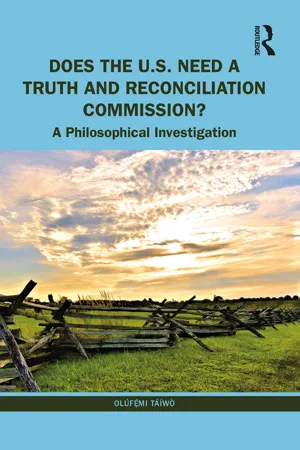
Does the U.S. Need a Truth and Reconciliation Commission?
A Philosophical Investigation
- 200 pages
- English
- ePUB (mobile friendly)
- Available on iOS & Android
Does the U.S. Need a Truth and Reconciliation Commission?
A Philosophical Investigation
About This Book
Written from the perspective of a philosopher and African immigrant, this book makes a forceful moral argument for the need for a Truth and Reconciliation Commission (TRC) in the United States to address the long history of injustice to African-Americans. It shows that a TRC—similar to those established in South Africa and Chile—would rescue the ideals embodied in the U.S. Constitution while expanding their promise. Rejecting more recent views of the country's founding as an embodiment of incorrigible racial oppression, Olúf?mi Táíwò sees in the U.S. Constitution, and the original utopia that was at its foundation, the best available means for achieving liberty and justice. But he simultaneously shows how only a TRC can successfully open the path to moving the U.S. past its long legacy of anti-black racism in particular and racial oppression, generally, towards a more perfect union.
Written with an immigrant's love of his new homeland but a clear-eyed view of its major shortcomings, the book rejects the idea of American exceptionalism in prescribing a solution that has worked elsewhere.
Key Features
- A clear view of the wide chasm between the ideals established at the U.S.'s founding and the subsequent society that developed.
- Combines first-person experiences of the author with close readings of modern political philosophy, W.E.B. Du Bois, Martin Luther King, Jr., Derrick Bell, and others.
- Traces the link between the denial of citizenship to Blacks, both historically and today, and anti-Black violence.
- Shows how an obsession with the law and legal reform will never adequately address the fundamental problem of anti-Black oppression.
- Shows philosophically the necessity of establishing a consensual view of the truth, and how it must precede any effective reconciliation.
Frequently asked questions
Information
Table of contents
- Cover
- Half Title
- Title
- Copyright
- Contents
- Introduction: Witness, Citizen—Coming to Terms with My Adopted Homeland
- 1 Two Triggers
- 2 The Limits of Legalized Politics: Or Why the Law is Not Enough
- 3 Bringing Politics Back In: W.E.B. Du Bois and Derrick Bell as Witnesses
- 4 Ye Shall Know the Truth: Or Why the Truth Must Precede Reconciliation
- 5 Between Nuremberg and Amnesia: The Case for a Truth and Reconciliation Commission
- 6 Re-Membering the Dis-Membered Country
- Index